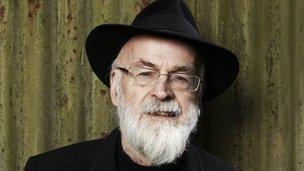Assisted suicide: 10 years of dying at Dignitas
- Published
- comments

Dr Anne Turner, pictured with her son Edward, died at Dignitas in 2006
Ten years ago a British man with terminal cancer travelled to Switzerland and drank a lethal solution of barbiturates to end his life, with his son and daughter by his side.
He was the first of more than 180 Britons to be assisted to die at Dignitas, a Swiss organisation founded in 1998 which helps people with terminal and incurable illnesses to end their own lives.
While euthanasia and assisted suicide are illegal in the UK, other countries, like Switzerland, do permit assisted suicide in specific circumstances - and Dignitas is the only Swiss facility to accept foreigners.
As a result, Dignitas has seen an average of 18 British citizens coming through its door each year since 2002 and many have chosen to be very open about what compelled them to travel abroad to die.
Having control over the timing of their death and avoiding a painful, lingering end have been the over-riding wishes of people like Dr Anne Turner, Peter Smedley and Jackie Meacock as they made their final journey to Zurich.
For those who travelled with them, there was always the fear of prosecution but, to date, no-one who accompanied any of the 182 Britons has been prosecuted.
Motivations
In the decade since, the debate over the 'right to die' has been played out through the high-profile court cases of Diane Pretty, Debbie Purdy and recently Tony Nicklinson - all of whom wanted assistance to die.

In February 2010, the Director of Public Prosecutions issued new guidelines, external to clarify who could face prosecution for assisting in another person's suicide.
He said a range of factors should be taken into account including the motivations of the person assisting and the victim's ability to reach a clear and informed decision about their suicide.
Sarah Wootton, chief executive of Dignity in Dying, which campaigns for a change in the law to allow assisted dying, said the new guidelines "were a watershed moment".
"At heart, people should not be prosecuted for compassionate assistance. We have to think about what is criminal and what is not."
Others, including disability campaigners, said the guidelines were dangerous and could lead to disabled people being pressured to end their lives.
But these guidelines did not change UK law in any way. The Suicide Act of 1961, external still makes anyone who aids and abets the suicide of another person liable to imprisonment for a maximum of 14 years.
Choice on care
Healthcare professionals will still be prosecuted for offering assistance to patients who want to die, and doctors' bodies such as the British Medical Association, the Royal College of General Practitioners and the Association for Palliative Medicine want it that way.
A 2006 survey of members of The Royal College of Physicians found that more than 70% were against a change in the law on assisted dying.
The focus, they say, should be on improving care for those approaching the end of life. The government responded in 2008 by publishing an End of Life Care Strategy, external covering adults in England which aimed to provide people with more choice about where they would like to live and die.
But Wootton says the law is inflexible as it stands.

"Parliament has turned a blind eye for 10 years as Britons travel abroad to die. In line with public opinion the law must change to allow people the choice of a doctor-assisted death at home and within upfront safeguards.
"Politicians have outsourced the problem to Switzerland."
However, Dr Peter Saunders, campaign director of Care Not Killing, says out of all deaths in the UK each year the numbers travelling to Switzerland to die "are really a very small trickle".
"The British media give huge publicity to the cases which do occur and make it seem more prevalent than it is - but in fact the numbers are very small."
In the last four years, the yearly rate at which UK people travel to Dignitas has not increased - and that is important, he says.
"There will always be a small number of determined individuals who will regard their lives as not worth living. But do you change the law for that small number of people?
"The first duty of the law is to protect its citizens - and that may mean that some determined people may not get what they want."
Flagbearer
Some want to see a distinction made in law between mercy killing and murder so that people like Jane Nicklinson could have helped her husband Tony, who had locked-in syndrome, to die at home.

Sir Terry Pratchett was diagnosed with a form of Alzheimer's in 2008
Novelist Sir Terry Pratchett, who was diagnosed with Alzheimer's in 2008 and is a supporter of assisted death, has become a flagbearer for the crusade to change the law.
He took part in a BBC Two documentary film which followed the final days of a 71-year-old British man who travelled to Dignitas in Switzerland to die.
Earlier this year, the Commission on Assisted Dying, external, an independent body set up with funding from Sir Terry Pratchett among others, looked in detail at the issue of assisted dying.
It concluded that any changes to the law would have to be balanced with giving people access to high quality end of life care and protecting the vulnerable in society. At the same time it said people should be provided with greater choice and control regarding how and when they die.
Next year a bill on assisted dying will be tabled in the House of Lords.
More debate
But is there any real likelihood the law could change?
Dr Saunders says Care Not Killing will continue to oppose a change to the law, alongside the medical profession and disability rights groups.
"The 1961 Suicide Act still fits a purpose. It continues to provide a strong deterrent. It gives discretion in hard cases too. It's clear and fair."
Looking ahead, Dignity in Dying predicts that a lot more countries will move to legalise assisted dying. Belgium, Luxembourg and the Netherlands have introduced legislation to allow assisted dying. France and Spain are currently considering a reform of their laws.
The model Wootton prefers is one that has been in place in the US state of Oregon for 15 years, which permits doctor-assisted dying. It gives terminally ill, mentally competent people the option of an assisted death.
A decade on from the first British assisted suicide at the now well-known Swiss organisation on a featureless commercial estate outside Zurich, the law has not changed but the debate rages on.
- Published20 September 2012
- Published20 September 2012
- Published22 August 2012
- Published14 June 2011
- Published8 December 2011